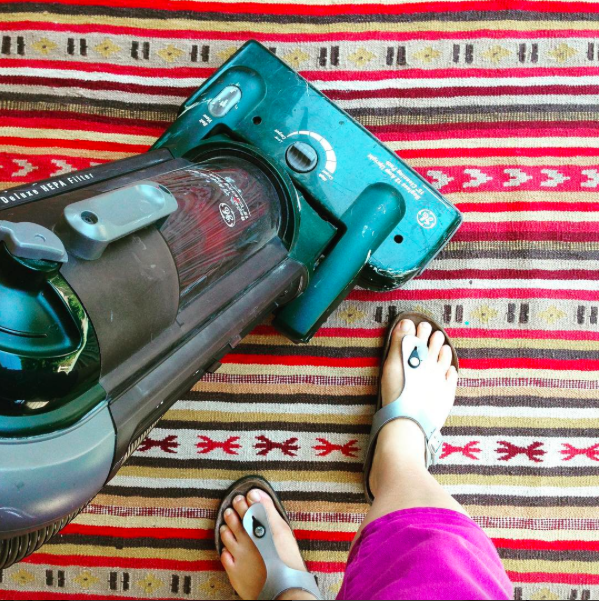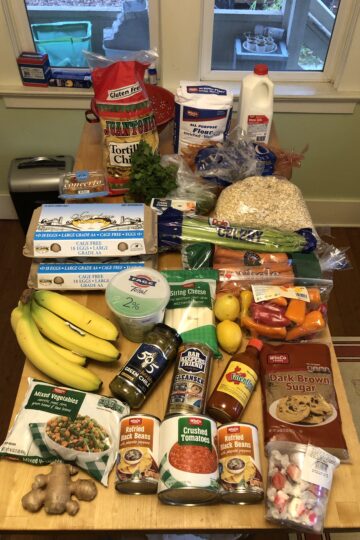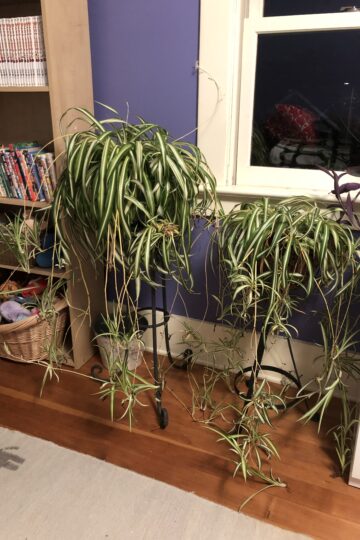Thrift Week -- What Does Thrift Mean to You?

As part of the Bring Back Thrift Week campaign, I ask you, the readers how does thrift fit into your life?
Is thrift solely about saving money, or is it more related to simple living? Does thrift mean getting everything you need for as little money as possible or is it about getting a good deal on a higher quality item than you could normally afford?
For me, thrift is about living a wealthy life without riches. To be able to pay for everything I want and need without too much out of pocket expense. But it's also about not wanting or feeling the need for that which is out my financial reach.
Being happy to vacation close to home for a few days at a time, instead of working overtime shifts, (or racking up credit card debt) to pay for a big blow-out tropical vacations. To live with less than desirable possessions until I can find second hand versions of what I want. To be willing to eat less than exciting meals at home and save restaurant meals for special occasions.
Thrift is about patience. Letting go of the "gotta have it now" mentality that derails so many debt reduction and savings plans.
What does thrift mean to you, and what keeps you inspired to live within your means? Is it specific books and websites? Have you been thrifty in the past and let that go, or have you been spendthrifty and are only now making changes to rectify prior financial blunders? Please share your inspirations and stories in the comments section below.
Katy Wolk-Stanley
"Use it up, wear it out, make it do or do without."
Please note that I will be away from internet access until Monday evening and will not be able to approve comments from first time readers until that time. Please do share your stories though, as I will make this task a priority when I return.





Thrift to me means all you mentioned plus making our food from scratch as much as possible. We seldom eat out or buy convenience foods. I am concerned with not only being thrifty with our money, but being thrifty with our health. The better quality food, the fewer medical bills. At least that is the goal, and debt is definately not good for the stress level or health.
This may not make sense, but to me, thrift means thinking. Before thrift was a word in my life dictionary, I would often blindly spend, be it not paying attention to prices and quality(i.e., going for the cheap, when it is actually cheaper in the end to go for the better quality, OR, assuming the expensive is the only way to go), mindlessly putting things NOT on my list in my cart, or spending for instant gratification.
Now that thrift is on the radar for me, I find myself just thinking. I will put something back, and decide to think about it first. I pay more attention to price, and what you get for it, etc.
Wow. A great way to think about thrift.
Kris,
I also equate thrift with "thinking." I like to think of it as being mindful and deliberate. Questioning routine and habit.
Thanks for such a "thoughtful" comment.
Katy Wolk-Stanley
The Non-Consumer Advocate
I was poor as a student and had my children when I was young. At that time, thrift was imposed by my circumstances. All of our possessions, to the exception of our futon and futon base were hand-me-downs, and I purchased almost all of my children's clothing at the thrift store until they began school. When I returned to work full time, we began replacing the old furniture by new items and renovated our home from top to bottom. Today, about 10 years later, thrift is back on our priority list. We sold the house we renovated, and live in a housing coop. Our current apartment is a little too small for perfect comfort, and neither is it situated in the neighborhoods we covet. However, rent is $ 500 per month in downtown Montreal, just in front of a quaint park, and we have a yard with two apple trees. Our coop neighbors are nice, have become friends and share many of our values. Thrift for us is about saving money so we don't need to work as much, and it is about using less resources so that perhaps there will be enough to go around so that all humans may benefit from a decent standard of living. It is also about spending less on things to have more money to spend on experiences such as travel.
For me, it's about mindful spending, which encompasses thinking about what I'm buying (whether new or used) and why. So, it is about thinking through the process. Is the item needed or just wanted? Am I only drawn to it impulsively, as in buying it in hopes it will improve my mood? Do I have something already like it at home that can be pressed into service? Is this the best way to spend limited resources, i.e. will the item be passed on when I am done with it, and will it eventually break down to its organic components?
I too often put items back once I think it through, and I also sometimes make a deal with myself about new things: if you still want it this time next week, come back. It'll still be here waiting. (I never do. By then I've forgotten about it, or realized I can live fine without it.)
Even with thrift shopping, I used to buy more than I could use. Things started to pile up around me. I would tell myself, oh, this is so wonderful/cute/cheap, someone I know is bound to need it! At some point, I realized the psychology of what I was doing, and weaned myself off that buy, buy, buy attitude. So now I only buy thrift store stuff if I know I can use it in the near future. I stand there appreciating the item for what it is, but most of the time, I leave it on the shelf for the rightful consumer to buy. I still struggle over making peace with my possessions, but it's much better than it used to be.
I have always lived within my means. Sometimes those means were quite generous, sometimes, er, not. But that's a very short term outlook. For me, thrift is about the future and about self control. I expect to live a long time, I want to enjoy it. I also feel that if I don't impose control on myself, who else is going to (especially during the times when the means were generous)?
For me being thrifty means that I can live within my means. It means spending less and buying less so that I can work less and spend more time at home raising my children and doing things that fulfill me like cooking & baking from scratch, caring for my home, growing a garden, playing games with my children. It also means that I don't waste as much time shopping. I try to need and want less and find enjoyment in all that I do have. If I do buy something, whether it's new or used, I try to get rid of something from the house so that I'm not always accumulating more things. People used to stay home more, shop less (less money, less shops), have less things, did more manual labor at home but seemed to have more time for family, music, crafts, games etc.
Is there enough room for a poem?? (Unknown author)
How Things Have Changed
There's one thing I would like to know,
How Grandma could relax,
Without a single modern thing
That saves our feet and backs.
Electric gadgets cook for me;
My sweeper cleans my rugs;
I call the pest control man
To rid my house of bugs.
The butcher cuts my chickens up;
The baker bakes my pies;
I just grab the pacifier
Whenever the baby cries.
I've thrown away the recipes
Of Grandma's home cooked food,
And now I buy the frozen kind
To feed my hungry brood.
And when the meal has been consumed,
The dishes wash themselves.
Someone folds the TV tables
And stacks them on the shelves.
My Grandma danced the minuet,
Had time to read and write;
But houseworks such an awful job
I'm too dead tired at night.
My grandma had hired help. 😉
Katy Wolk-Stanley
The Non-Consumer Advocate
My grandmother did not have a paying job.
My other grandmother worked in the family's corner store. That family did not have time to minuet. My grandfather had time to read only because he sacrificed one of his hours of sleep to do it. Stubborn old coot - he paid for it with his health.
We realized what thrift truly means to us when we were planning our fall 2008 wedding. Thrift for our family means doing as much research into the things we care most about and being willing to tighten the budget in other areas to get the best quality for those items. For everything else, we seek out the best deals possible, though that doesn't mean that the least expensive option is always the best option.
Thrift for me means "buying" my freedom; it's my husband's and my plan to leave corporate life at the end of this year and do other things with our lives.
I came from a thrifty family but fell into bad ways in my younger years. I had to smarten up when I found that credit does not go on forever! Now thrift means that I won't buy everything I want because I know that I need to have some money set aside for the future; it means appreciating the simple things in life, like potatoes, fresh vegetables, and even beans. Thrift puts us in fraternity with 85% of the world, who must live the simple life in order to survive. Thrift puts us in harmony with Creation when we are mindful of the ultimate cost of our consumption.
My frugal husband has actually taught me to buy nothing I can't pay for all at once. So I pay off the two credit cards I use every month. NO debt. Now I just bought a wildly expensive handmade oriental rug and I have to reach into my private stash to buy this beautiful thing, but again I won't let the payment drag on. Just pay as you go.
I don't know about all of you, but I find myself struggling with spending the most when I am at a thrift store.
When I am at a store selling new items, it is easier for me to say "I can get that cheaper if I need it" and put it back. When I am at a thrift store, and the price is cheap anyway, I find myself thinking "I can't get that cheaper and it could be gone. I may need it, and...and...and"
I always take one of my kids, a friend or my husband with me when I go to a thrift store because they keep me in check 😉
I grew up somewhat poor so for many years I spent money, more money than I had, but I was like an addict when I came to shopping. I had the debt to prove it and that debt was a huge weight that left me in an almost constant state of worry about how to make payments what would happen if a job was lost or my husband would go on strike. It was not a good way to live!
I finally decided that I had to make a change and thrift would have to be a large part of it. I started by paying off a $5,000+ credit card debt that a times left me sleepless at night with worry.
To do that I had to make major changes in my life style. And once I started making those changes I found, much to my surprise, how little real happiness I was getting from all those purchases. In fact the most happiness I got was the act of picking the things up and buying them. Once I had them home they had already lost most if not all of their value to me. They were just more junk I had to deal with and were often put away and forgotten about.
The next step was to clean out all the clutter that had grown out of control as I tried shopping my way to happiness. I just wanted it gone! As I hauled stuff to Goodwill by the truckload I could not help but think of all the hours that had been wasted working to first buy it all and then even more hours spent in the care of all that stuff/junk. Time wasted that I could have spent in so many way that would have made my life and maybe someone elses much richer.
I am now out of debt and with the recession very very thankful that I do not owe the blood sucking banks any more hard earneed money.
I live a much simpler and much happier life and am trying to teach my 4 year old grandson the lessons it took me so many years and so much pain to learn.
I am still decluttering, have gone back to gardening and now I always stop and think and question any purchase I make.
I feel much more in control of my life and my money. I don't have a lot ,but I am content with what I have and that awful, endless worry about money that used to keep me awake at night is long gone.
One thing I have found to help a lot is to not watching TV. Getting away form the commercials and the depictions of an uppermiddle class life style helped to reconnect me to what is real.
The consumer lifestyle we are living is not sustainable and will have to come to an end sooner or latter before it destroys our entire and only planet.
I want my grandchildren to have a future that is more than having enough money to buy the latest hot/cool/in/must have brand.
When it comes to thrift, I've traveled the full circle. As a child, I was raised in a frugal environment and became skilled at saving. Then during my young adult years (when the credit card companies were plying everyone with unsolicited cards), I went temporarily insane. I spent more than I could afford on things that were questionable at best. Now, in middle age, I'm back to thrift and always seeking new ways to conserve. It's mostly from necessity because I live on social security disability payments, but I also feel a kind of satisfaction when I find new ways to make do without buying anything.
Thrift to me means making sure my real needs are satisfied. For example, I need some alone time away from kids to read a book or soak in the tub or take a walk; I don't need a spa-day. As a family we need time to play, learn and work together; we don't need to go out to the movies and Chuckee Cheese. We need the occasional family getaway; camping fulfills that better than seeing that Mouse in Florida twice a year. For me, I need to be creative and artistic; I don't need to visit the craft store to buy stuff three times a week. I need nice meals with my family; I don't need expensive and unhealthy restaurant meals. I need date nights with my husband; we don't need them to be at the best restaurant in town (our best dates have been spent nursing a $3 coffee and just talking for hours.) My kids need me to get on my belly and play; they don't need one more toy. Basically, I am learning that by taking away that knee-jerk desire to throw money at something, which isn't satisfying, I am better able to find truly satisfying ways to meet my needs and those of my family. When my real needs aren't met , I end up wasting a lot of money on wants. I stay motivated by reading books and blogs, visiting forums like this, and "outing" myself to friends, many of whom are closet cheapskates too.
Thrift to me...first and foremost it means being happy and satisfied with what I have and with my life.
It means figuring out a way to do something, versus having to buy an item; making wholesome home made meals and snacks; mending clothing; and being creative and finding free or inexpensive things to do.
It means not disposing of something just because it doesn't look new anymore; repurposing items; repairing items; and re-gifting items :o)
I also try to be thrifty with my time. I don't want to "waste" my time on things that aren't important to me.
We all give up our life energy and work hard for our money. I want my money to work hard for me.
I'll echo others above and say thrift to me means mindful spending. For my husband and me, thrift with our present 2 incomes means the ability to live as we want to later with less work.
Thrift makes its way into my life in many forms.
I too eat at home more than at restaurants. I forage for food in my own neighborhood. Plant a garden. Buy whole chicken and use it all up (the cats love it too).
There is thrift at home too with 2nd hand furniture, kitchen gadgets, art and even plants.
The fun thrift is buying clothes and raw material for art projects. I am currently making a blanket from wool sweaters that were washed or have tears. I felt (=wash and shrink) them before making them into blankets.
Thrift is an opportunity rather than noun. It is putting up, making do, walking, writing letters, re-using, waiting, making, sewing, smelling, thinking now, challenging to say "why do I need this?", "what else can I use".
Most people want you to think big, I say think thrift!
I'm trying to make thrift a way of life for myself and my husband. We want to get our debts paid off as quickly as possible. So I'm doing my best to use what we have, research costs on things, and use coupons! My husband and I also have a monthly allowance that we can spend, beyond that we can't spend, the rest of the money is saved (in savings accounts) or used to pay bills. That way we both focus on being more thrifty with our purchases to stretch that monthly allowance. I love shopping at used stores, I went to the Habitat for Humanity Restore today and got an awsome play gym for my pet parrot for only $35 (this playgym had to be originally $300 or more and looked barely used). I was very proud of my purchase!
I like your definition, Katy, of living a wealthy life without spending a lot of cash. I don't long for the newest electronics and snazziest cars, so not having those things is all the same to me. As for eating out, except for our occasional foray to a Mexican restaurant in Detroit where the two of us can get dinner for around $14 total, we like the food we make at home better than most restaurants anyway. I mean that.
Living frugally enables me to spend money on things that matter to me, such as the thyroid treatment my dear 14-year-old cat, Scottie, underwent two weeks ago. It was a treatment that rids the cat of the thyroid tumor, with no after-effects; it's not something that's going to prolong pain, but improve his quality of life. He's looking better already! Some friends who wheedled the cost out of me questioned my spending decision. I don't ask them whether the newest model of the iPhone was really necessary to replace the $500 one they bought last year, or whether a lower-priced laptop would have done the job rather than the $2,500 Mac with all the bells and whistles, which one friend says his 3-year-old already is allowed to play with and has dropped off the couch and onto the floor. Priorities!
When I was laid off from my copy editor job with the Detroit daily newspapers last month, I didn't panic, because our standard of living (it's my husband, me, four cats and a dog) isn't going to change. Unless I make FEWER visits to thrift stores, hahaha.